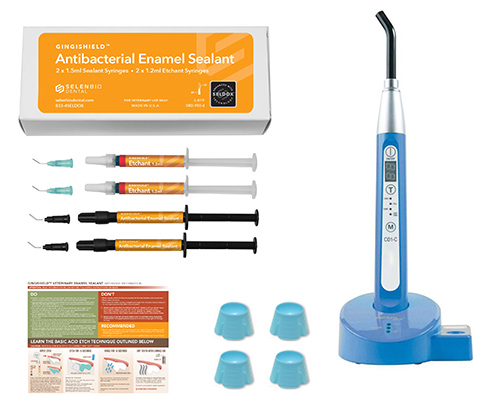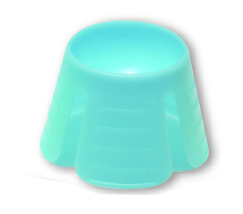GingiShield Starter Kit
GingiShield Starter Kit (inkl: GIN001, L6000, END001)
GingiShield™ clear, light-cured enamel sealant features SELDOX® antibacterial technology to help protect teeth against the bacteria and plaque responsible for periodontal disease. Based on an FDA-cleared formulation used in human dentistry, GingiShield™ is applied to etched enamel and light-cured for long-lasting protection of at-risk tooth surfaces.
GingiShield™ Starert Kit includes:
- LED Curing Light
- 2 x 1.5ml Sealant Syringes
- 2 x 1.2ml Etchant Syringes (37% phosphoric acid)
- Disposable Syringe Tips
- Disposable Applicator Brushes
- Dispoable Dappen Dishes
- Instructions For Use
- Instruction Graphic Card
Approxiamtely 20 treatments per pack, working out at around €6.25 per treatment!
Periodontal disease (gum disease) is caused by bacteria in dental plaque and leads to bad breath, tooth loss, bone loss, and heart, kidney, and liver disease in both dogs and cats. ?
GingiShield™ can help prevent periodontal disease.
GingiShield is a clear, long-lasting antibacterial tooth sealant that kills bacteria and inhibits plaque formation on teeth, reducing the risk of gum disease. ?
Based on the FDA-approved DenteShield™ sealant for human use, GingiShield™ Antibacterial Enamel Sealant is the only dental sealant with SELDOX® antibacterial activity that is available for veterinary patients. ?
GingiShield™ is a light-cured resin sealant available in both a starter kit and refill package. The clear sealant is applied by veterinary professionals during the dental cleaning and lasts until the next annual cleaning or longer.
FAQS
What is GingiShield™ Antibacterial Enamel Sealant?
GingiShield is a clear sealant applied to at-risk teeth by veterinary professionals. GingiShield kills harmful bacteria and helps prevent the formation of plaque, reducing the risk of periodontal disease (gum disease).
Is GingiShield Safe?
Yes. GingiShield is the same product used by dentists and cleared by the FDA to seal and protect children's teeth, but formulated for veterinary use. GingiShield is non-toxic and is safe for dogs and cats of all sizes.
How is GingiShield different from other veterinary dental sealants?
GingiShield is the only sealant with patented SELDOX antibacterial protection - safely killing bacteria and inhibiting plaque formation. Additionally, other veterinary tooth sealants must be reapplied frequently between dental cleanings, while a single GingiShield application lasts a year or longer.
Can GingiShield be applied at home?
No, GingiShield must be applied only by veterinary professionals. Application requires specialized equipment and training. GingiShield is applied during routine dental cleaning.
Can GingiShield be applied to deciduous teeth?
Practically, there is no reason to apply GingiShield to deciduous teeth because the teeth are only in the mouth for about 8-11 weeks before they exfoliate and are replaced by the permanent teeth. Technically, it could be applied though this application is not recommended because there is an increased risk of pulpitis due to the very thin dentin.
Can GingiShield be applied to other species besides dogs/cats?
At this time, there is no known contraindication for application of GingiShield to healthy teeth of other species. Please contact us with species-specific questions.
What is the benefit to risk comparison?
The benefit is that GingiShield significantly inhibits the attachment of bacteria to the tooth surface, which deters biofilm (plaque) formation. Biofilm is the main cause of gum disease (gingivitis and periodontitis). Properly applied, there is no known risk associated with GingiShield application other than the added anesthesia time, typically 10 minutes per patient with an experienced technician. GingiShield is based on the FDA-cleared DenteShield™ product used in human dentistry.
Can GingiShield be applied as a surface sealant on direct composite restorations?
Yes, applying a top layer of unfilled resin, such as GingiShield, to direct composite restorations has been shown to decrease microleakage. Also, the antimicrobial properties of GingiShield should reduce the tendency of composites to facilitate bacterial adhesion and biofilm formation.
Is toothbrushing still necessary?
Yes. When people have dental sealants applied they still need to brush their teeth and have regular professional dental cleanings and x-rays. The same is true for pets.
Can GingiShield be applied to exposed root surfaces?
Yes, in selected patients as part of a complete treatment plan. Please contact us for specific information. Dental x-rays of the affected tooth are necessary.
Can GingiShield help with enamel hypoplasia/hypocalcification and/or enamel defects?
Yes, in selected patients as part of a complete treatment plan. Please contact us for specific information. Dental x-rays of the affected tooth are necessary.
What would be the GingiShield recommendation for CUPs patients?
There is no definitive data yet as to whether or not GingiShield will benefit CUPS patients. However, as it is an additional way to help control plaque, it is expected that the sealant will be beneficial.
This answer will be updated as new information becomes available.
Does annual etching and application of GingiShield deteriorate enamel?
Enamel remineralization, and demineralization, occurs constantly. After the initial application of GingiShield, subsequent annual applications will result primarily in etching and application atop remaining sealant material.
Because the sealant is applied to buccal/labial surfaces, the sealant can over time create a thicker sealant layer without any interference with occlusion.




